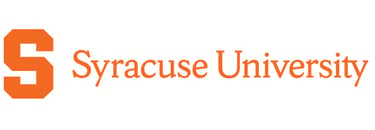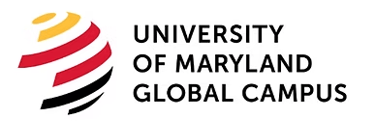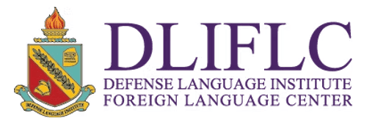Academic Achievements
I attended Syracuse University for my Master's degree in Applied Data Science. My coursework included classes in data science, R, business analytics, statistics, databases, and data visualization. I pursued the Language Analytics track with a focus on Natural Language Processing (NLP) and Artificial Intelligence (AI). I graduated in 2025 while balancing a full-time job as a data scientist doing NLP work.
Degree capstone presentation: https://www.youtube.com/watch?v=i2FiD65BxFw
I graduated Magna Cum Laude from University of Maryland Global Campus (UMGC) with a Bachelor's in Software Development & Security and received an Associate's in Arabic Language Arts from the Defense Language Institute (DLI).


M.S. in Applied Data Science
Syracuse University
2022 - 2025
GPA: 4.0
IST 782 - Applied Data Science Portfolio
Students select course projects from data science courses that they have previously taken and reflect on those projects and think about which program learning outcomes were demonstrated in each of their selected projects.
IST 719 - Data Visualization
This course is a broad introduction to data visualization for information professionals through demonstrations, recipes and examples of various data visualization techniques. Students are introduced to the programming language R, Adobe Illustrator, simple data cleaning techniques, simple design concepts and the ethics of visualizing data. The focus is on developing static data visualizations to visually explore and communicate findings using data from a variety of sources. Conceptual themes are presented alongside technical aspects of data visualization.
IST 615 - Cloud Management
Cloud services creation and management. Practical experience in using, creating and managing digital services across data centers and hybrid clouds. Strategic choices for cloud digital service solutions across open data centers and software defined networks.
IST 722 - Data Warehouse
Introduction to concepts of business intelligence (BI) and the practice/techniques in building a BI solution. Focuses are on how to use data warehouses as a BI solution to make better organizational decisions.
IST 686 - Quantitative Reasoning for Data Science
Multiple strategies for inferential reasoning about quantitative data. Methods for connecting data provenance to substantive analytical conclusions.
IST 736 - Text Mining
Introduces concepts and methods for knowledge discovery from large amount of text data, and the application of text mining techniques for business intelligence, digital humanities, and social behavior analysis
IST 664 - Natural Language Processing
Students in this course will explore all the levels of linguistic analysis, going from tokenization, word-level semantics, part-of-speech tagging, syntax and semantics up to the discourse level. They will also use NLP techniques on unstructured data using Python, including information retrieval, question-answering, sentiment analysis, summarization and dialogue systems.
IST 707 - Applied Machine Learning
General overview of industry standard machine learning techniques and algorithms. Focus on machine learning model building and optimization, real-world applications, and future directions in the field. Hands-on experience with modern data science packages.
IST 652 - Scripting for Data Analysis
The goal of this class is to teach students the tools and skills of scripting needed to solve problems of accessing and preparing data in a variety of formats and situations, sometimes known as data wrangling. The scripting will provide the skills needed to form data science pipelines, from acquiring and cleaning data to accessing data and transforming data for analysis or visualization.
IST 659 - Data Administration Concepts & Database Management
Definition, development, and management of databases for information systems. Data analysis techniques, data modeling, and schema design. Query languages and search specifications. Overview of file organization for databases. Data administration concepts and skills.
IST 687 - Introduction to Data Science
Introduces information professionals to fundamentals about data and the standards, technologies, and methods for organizing, managing, curating, preserving, and using data. Discusses broader issues relating to data management, quality control and publication of data.
SCM 651 - Business Analytics
Business analytics including advanced spreadsheets; relational database and SQL queries; statistical analysis in R including multi-linear regression, interactions, tests for regression assumptions, logit, probit; neural networks; and dashboards.
B.S. in Software Development & Security
University of Maryland Global Campus
2019 - 2021
GPA: 3.96
CMSC 495 - Trends Project in Computer Science
An overview of computer technologies, with an emphasis on integration of concepts, practical application, and critical thinking. The goal is to research, plan, conduct, and complete collaborative computer-related projects in compliance with schedule deadlines. Analysis covers innovative and emerging issues in computer science. Assignments include working in teams throughout the analysis, design, development, implementation, testing, and documentation phases of the projects, including periodic peer reviews.
CMSC 307 - Artificial Intelligence Applications
An interactive, hands-on study of current artificial intelligence (AI) applications spanning multiple disciplines and domains, including business, science, communications, and computing. The goal is to use datasets with AI and machine learning applications from leading cloud vendors, including Amazon and Microsoft. Projects and laboratory exercises demonstrate how AI can be used to solve problems across a wide variety of disciplines.
SDEV 460 - Software Security Testing
A hands-on study of exploits, attacks, and techniques used to penetrate application security defenses and strategies for mitigating such attacks. The objective is to apply appropriate methodologies for software penetration testing to identify application weaknesses and logic flaws and to test and create scripts for exploitation and discovery. Topics include web architecture, application infrastructure, reconnaissance, discovery, mapping, and exploitation.
CMSC 325 - Game Design and Development
A project-driven study of the theory and practice of game design and development. The aim is to build realistic graphical 3-D worlds, animate characters, and add special effects to games. Discussion covers critical mathematical concepts and real-time game physics. Projects include collaborative development of interactive games.
SDEV 400 - Secure Programming in the Cloud
A hands-on study of programming secure applications in the cloud. The goal is to design and build applications in the cloud while implementing appropriate security policies. Topics include cloud computing models, risks, and security challenges of programming in the cloud, and data security.
SDEV 425 - Mitigating Software Vulnerabilities
An in-depth analysis and evaluation of the mitigation of software vulnerabilities. The aim is to detect and mitigate software vulnerabilities by evaluating code. Topics include language-specific software vulnerabilities, mitigation, and input validation.
CMSC 427 - Artificial Intelligence Foundations
A study of the theoretical foundations and practical applications of artificial intelligence. The objective is to develop algorithms and systems to demonstrate intelligent behavior. Topics include intelligent agents, searching algorithms, knowledge representation, probability, logic, and learning.
SDEV 350 - Database Security
A study of processes and techniques for securing databases. The objective is to design, build, and maintain databases to minimize risks and security attacks. Topics include privileges and roles, user accounts, encryption, authentication methods, and auditing.
SDEV 325 - Detecting Software Vulnerabilities
An in-depth, practical application of techniques and tools for detecting and documenting software vulnerabilities and risks. The goal is to research, select, and use software to analyze code and isolate and prioritize application code and processes that could lead to failure or compromise data integrity or privacy. Topics include the top 25 software vulnerabilities, secure coding guidelines, static code analysis, and software assurance metrics.
SDEV 360 - Secure Software Engineering
An in-depth study of the processes, standards, and regulations associated with secure software engineering. The objective is to plan, manage, document, and communicate all phases of a secure software development cycle. Topics include security requirements, secure software life cycle development, threat modeling, and Security Technical Implementation Guides (STIGs).
SDEV 300 - Building Secure Python Applications
A hands-on study of best practices and strategies for building secure Python desktop and web applications. The objective is to design and build Python applications that are resistant to common security threats. Topics include syntax, data structures, style guides, data munging, web application frameworks, and the use of secure coding tools and processes to guard against application vulnerabilities.
CMIS 320 - Relational Database Concepts & Apps
A study of the functions, underlying concepts, and applications of enterprise relational database management systems (RDBMS) in a business environment. The aim is to appropriately use databases to meet business requirements. Discussion covers entity/relationship diagrams, relational theory, normalization, integrity constraints, the Structured Query Language (SQL), and physical and logical design. Business case studies and projects include hands-on work using an industry-standard RDBMS.
WRTG 391 - Advanced Research Writing
Instruction and practice in academic research skills. The objective is to critically analyze scholarly and other credible sources and effectively integrate source material into a complex argument. Emphasis is placed on synthesizing multiple sources in producing a literature review on a focused topic.
CMIS 242 - Intermediate Programming
Further study of the Java programming language. The objective is to design, implement, test, debug, and document Java programs, using appropriate development tools. Topics include object-oriented design, event-driven programming, exceptions, recursion, arrays, and data structures.
CMIS 141 - Introductory Programming
A study of structured and object-oriented programming using the Java language. The goal is to design, implement, test, debug, and document Java programs, using appropriate development tools. Projects require the use of algorithms, simple data structures, and object-oriented concepts.
CHEM 121 - Chemistry in the Modern World
An exploration of chemistry as it relates to human life and the environment. The goal is to use a working knowledge of chemical principles, scientific reasoning, and quantitative reasoning to make informed decisions about health and safety matters. Discussion examines natural processes and human factors in the modern world using the principles of chemistry and the scientific method.
BIOL 161 - Lab In Human Biology
A laboratory study that uses the human organism as an example to illustrate the concepts underlying the organization and interrelationships of all living organisms.
WRTG 112 - Academic Writing II
Continued practice in reading, writing, and critical thinking with an emphasis on research and argumentation. The goal is to implement strategies for analyzing ideas and rhetorical techniques in academic texts and for conducting academic research. Focus is on writing an argumentative research paper that synthesizes information and ideas from multiple sources and demonstrates critical thinking, varied rhetorical strategies, proper source documentation, and effective language use.
BIOL 160 - Human Biology
A general introduction to human structure, functions, genetics, evolution, and ecology. The aim is to use scientific reasoning to make informed decisions about topics related to human biology. The human organism is examined from the basic cellular level and genetics, through organ systems, to interaction with the outside world. Discussion also covers pertinent health topics.
WRTG 111 - Academic Writing I
An introduction to reading, writing, and critical thinking in an academic setting. The goal is to practice strategies for understanding academic texts and for developing one's ideas in relation to those texts. Focus is on writing thesis-driven essays that incorporate ideas and information from sources and demonstrate critical thinking, proper attribution, and effective language use.
PSYC 310 - Sensation and Perception
A survey of theories and historical and contemporary research in how the auditory, visual, gustatory, olfactory, kinesthetic, and tactile senses acquire information and how psychological, anatomical, physiological, and environmental factors help us perceive the world. The objective is to apply an understanding of complex neural and behavioral processes to evaluate research and analyze variations within and between species.
MATH 115 - Pre-Calculus
An explication of equations, functions, and graphs. The goal is to demonstrate fluency in pre-calculus; communicate mathematical ideas appropriately; solve equations and inequalities; analyze and graph functions; and use mathematical modeling to translate, solve, and interpret applied problems. Topics include polynomials, rational functions, exponential and logarithmic functions, trigonometry, and analytical geometry.
CMIS 102 - Intro to Problem Solving & Algorithm Design
A study of techniques for finding solutions to problems through structured programming and stepwise refinement. The objective is to design programs using pseudocode and implement them in an appropriate programming language. Hands-on practice in debugging, testing, and documenting is provided. Topics include principles of programming, the logic of constructing a computer program, and the practical aspects of integrating program modules into a cohesive application. Algorithms are used to demonstrate programming as an approach to problem solving.
LIBS 150 - Introduction to Research
An introduction to the research process and methods for retrieving information in a library or through online sources. The aim is to identify an information need and locate, evaluate, and use appropriate resources in keeping with academic integrity and ethical standards. Focus is on implementing effective strategies for finding relevant information--including selecting appropriate print and electronic sources and effectively using web search engines and the UMGC Library's electronic resources to find information--and evaluating and correctly citing the information found.
PSYC 100 - Introduction to Psychology
A survey of the basic principles, research concepts, and problems in psychological science. The biological, cognitive, and social perspectives of human thought and behavior are addressed. The goal is to apply major concepts and use the scientific method to enhance the understanding of individual, community, and organizational life experiences. Topics include neuroscience, sensation and perception, learning and conditioning, memory, motivation, language and intelligence, personality and social behavior, and psychopathology and therapy. Applications of psychology are also presented.
A.A. in Arabic Language Arts
Defense Language Institute
2013 - 2014
GPA: 3.6
AD 340 - Arabic Area Cultural Studies
Exploration into the analysis of literary texts pertaining to genre, concepts of literary structure, language, and criticism through examination of selected works. Emphasis on reading comprehension, writing skills, and analysis of compositional techniques.
AD 320 - Comprehensive Military Topics in Arabic
Emphasis contintues to be on all four language skills: speaking, listening, reading, & writing. The readings for the class are focus on military topics using modern Arabic in a variety of contexts. Students will be expected to give classroom presentations and to write short essays in Arabic.
AD 310 - Advanced Arabic Conversation
The course will concentrate on the reading and speaking skills at the advanced level. Students will be assigned reading and audio-visual materials on which to prepare oral classroom presentations.
AD 302 - Advanced Arabic II
Continuation of advanced Arabic.
AD 301 - Advanced Arabic I
Advanced colloquial and Standard Arabic, developing reading, writing, speaking, listening skills.
AD 240 - History & Geography of the Arabic Region
Content-focused Arabic language course on topics in Arabic culture, history, geography, and society with supplemental language instruction materials.
AD 220 - Introduction to Military Topics in Arabic
Continued study of cultural and linguistic issues in the translation of Arabic and English language texts. Systematic development of advanced skills in localization and computer-aided translation. Translation practice, individually and in translation teams, with increasingly longer and more specialized texts. Prepares localization and translation specialists for real-world careers in the language-services industry.
AD 210 - Intermediate Arabic Conversation
Students continue to develop conversational skills and cultural knowledge. Emphasis on speaking, listening, building vocabulary, and providing practice in a broad range of communicative and cultural contexts.
AD 202 - Intermediate Arabic II
Continuation of intermediate Arabic.
AD 201 - Intermediate Arabic I
Continued immersion in the culture and language of Arabic-speaking countries. Application of strategies and technology in mastering listening, speaking, reading, and writing at the intermediate level.
AD 140 - Introduction to Arabic Culture
This course looks at the differences between classical and regional colloquialisms as well as elements of Middle Eastern culture.
AD 120 - Introduction to Job-Related Skills in Arabic
Introduction to cultural and linguistic issues in the translation of Arabic language texts. Students will explore current technologies used in various real-world translation contexts and how to adapt texts, products, and services to the locale for which they are intended.
AD 110 - Elementary Arabic Conversation
Practice in oral expression with an emphasis on developing conversational skills and improving language proficiency in reading and writing.
AD 102 - Elementary Arabic II
This intensive course builds upon AD 101 with further instruction in basic oral expression, listening comprehension, elementary reading and writing, and continues with further development of these four skills at the intermediate level.
AD 101 - Elementary Arabic I
This intensive course begins with instruction in basic oral expression, listening comprehension, elementary reading and writing, and continues with further development of these four skills at the intermediate level.






